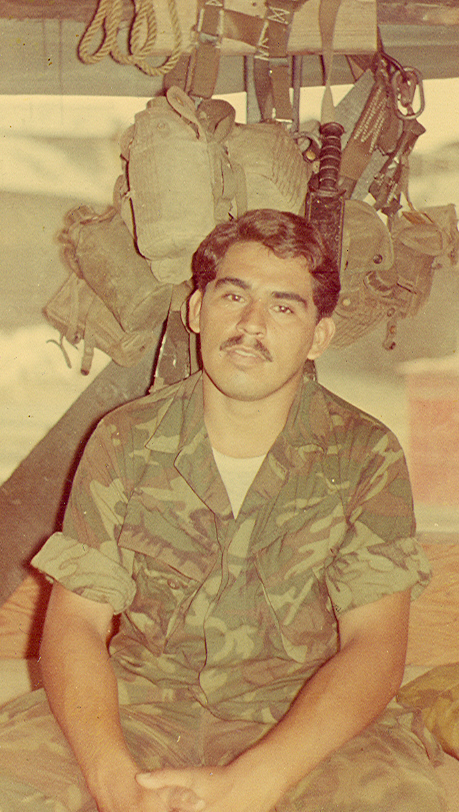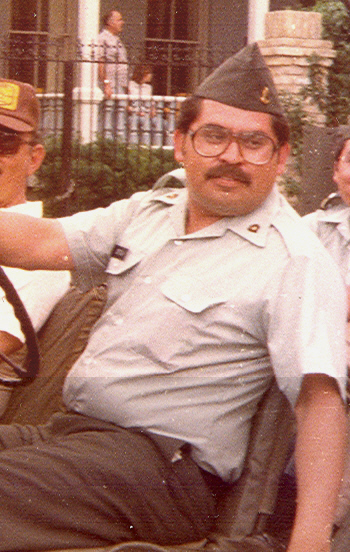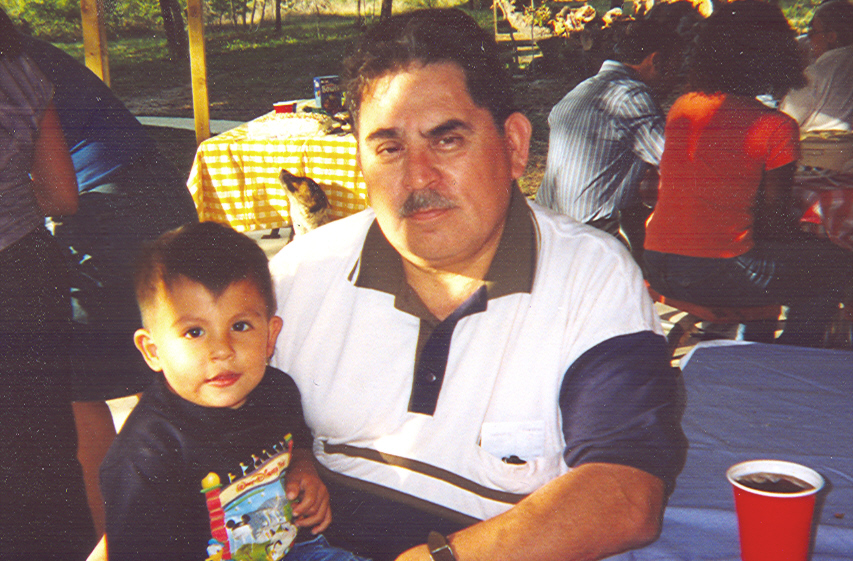Anthony Martinez Ortega Jr.


Did other family members enlist in previous wars?
We have a long, long history in military service my uncles, and cousins, and brother were all in the military.
Your father?
And my father. My father spent 22 years in the National Guard, the Army National Guard.
Did he serve in World War I or World War II?
No he was in between the wars.
How was Vietnam portrayed by the press?
In 1969 when I entered the Marine Corps. Vietnam was a war, which people did not know much about. As the years progressed Vietnam
started to get on the news more people were starting to notice that more and more of our soldiers were getting killed in Vietnam
so they started an anti-war campaign.
Do you remember your
draft number?
In 1969 they did not have a draft number. I was a 1A which meant that I was eligible to get drafted but instead after I graduated
high school my friend and I, Arthur, went to the Marine Corps and we were going to go on the buddy buddy plan as it turns out we went to the
recruiter and Arthur flunked the written test so the recruiter said, "that's no problem" he pointed at me and said, "you take the test
over and I'll use your test for Arthur" and then they sent us to take our physical well Arthur flunked the physical also at that time the
recruiter said, "Arthur, you're staying and Anthony, you are going to the Marines" so needless to say we did not go on the buddy buddy plan.
Why did you decide to join the Marines?
I thought the Marines were the best and I wanted to be a part of the best that you could be so I like many other young men went to join
the Marines at first we thought we were fighting for God, corps, and country but then as the years go by we found out that we were fighting
a war that was very unpopular.
How old were you?
I was 19 years old.
What did you yourself know about Vietnam?
I did not know anything about Vietnam until I joined the Marine Corps. Once I joined the Marine Corps, the drill instructor said all of you
are going to Vietnam so you better start learning right now how to survive. That was my first introduction to Vietnam.
Before going what was your role?
After 12 weeks of boot camp they gave us a MOS, a military occupation specialty. My specialty was communications I was a 2511, which
meant that I repaired telephone lines, I talked on the radio, I repaired the radio, and we set up communications wereever we would go.
How did you feel when you arrived in Vietnam?
I was excited about going to Vietnam. I was all gung ho I was going to go and win the war all by myself. On the first night that we were in
Vietnam the machine guns the motars they never did stop all night long it was then that I finally realized, then it dawned on me what did I get myself
into. From then on on the very second day in Vietnam I knew I had to be careful because they were playing for real it was no more war games this
was for real.
Where were you stationed?
We landed in
Da Nang and from Da Nang we went to Quang Tri and Chu Lai and the DMZ
(demilitarized zone.
The dividing line between North and South Vietnam established in 1954 at the Geneva Convention.).
The DMZ is the farthest point north and from there we guarded
the DMZ for three months and then from there we went to Quang Tri and then to Chu Lai and then finally to Da Nang. We were the last of the 3rd
Marine division. We were the
Third Marine Amphibious Forces and the 3rd Marines were getting ready to be pulled out of Vietnam so in essence were the last of
the 3rd. The first Marines, which is the first Marine division, was getting ready to take over Da Nang so we were the last of the 3rd.
Describe a typical day in Vietnam.
A typical day we would get up about 5:30 in the morning and depending on where we were. If we were out in the field we would sleep out on the ground
wake up, eat some cold
C rations and then get ready to hop another 10 miles 15 miles that day. If we were in the base camp then we would get up go to the
mess hall and then go set up communications and stand on guard duty. If we were out on the field we would follow the grunts, which were the infantry since
I was in communications, I was a radio operator, we would usually follow the infantry and set up the communications and if we got hit we set up communications
bringing in evacuations calling motors do all the communications, where we were and where we were going what the mission was, all day long for
about 12 hours. Then after 12 hours we would set up a base camp. We would set up a perimeter and then we would take turns on guard. We usually would sleep two or three hours
and rotated everybody would get a watch for a couple of hours and then rotate.
How were you injured?
This was when we had gotten back to Da Nang. I was in Da Nang we were setting up communications I went up a telephone pole I was up approximately 25
to 30 feet and a sniper started shooting he shot one time and hit the telephone pole. He shot another time he me in the elbow and I came falling
down landed on my back by that time all the grunts that were around us all rushed towards the sniper I never did find out if they got the sniper or not.
Were you sent to a hospital?
I was medevac from Da Nang I went to the first Marine Medical Battalion, which was in Da Nang over by Freedom Hill. From there I got treated. The doctors
looked at me, they had to set my arm back and one said, "Do we need to give him anesthesia" and the doctor looked at me he said, "No he's a Marine he don't need
no anesthesia". They held me down and pulled my arm back together.
How long did you stay in Vietnam?
I was in Vietnam about 11 months and from Vietnam I got the million dollar wound because that meant that I had already spent more than 10 months in Vietnam
and if you got wounded you would get sent home. So I got sent to Corpus Christi, the medical naval hospital, but they were full so they sent me to Fort Sam. Which
was great for me because I lived in San Antonio where Fort Sam was.

What medals did you earn after the war?
During the war I earned a National Defense Ribbon I earned a Vietnam Campaign Ribbon, a Vietnam Service Ribbon, a Combat Action Ribbon, and a Purple Heart.
Purple Heart for being shot?
Yes.
What can I learn from your experiences in Vietnam?
I think what everybody can learn is that peace is what every nation strives and war is the last resort.
Were your family and friends told that you had been shot?
When I got shot in Vietnam my friend Stuart and I had made a pact that if we ever got shot and we lost an arm or a leg that we would shoot each other because we
did not want to come back crippled or without an arm or a leg. I got shot in the arm my friend thought that he was going to have to shoot me and he was crying because he didn't
want to shoot me. I realized what he was crying about and I told him "no no I'm ok don't shoot" he thought he was going to have to shoot me and kill me because
of the pact we had made. When I got shot they sent two Marines to my mom's house they told my mom that I had been shot in the head and they didn't think that I
was going to make it so my mom and dad were very concerned because they thought they had lost me. It wasn't until I got to Fort Sam that I called them and told them
that I was ok that they were finally relieved. They had to see me so they rushed to Fort Sam and picked me up they were touching me and feeling me and saying are you
ok because they thought that I had been shot in the head and I was going to die.
Did you see your brother in Vietnam?
Both my brother and I were in the Marine Corps at the same time and we spent six months in Vietnam. While in Vietnam I got to see my brother two times. Once on my
21st birthday I went over to see him and we were
rapelling from a helicopter. It was the first time that I rapelled from a helicopter and it was scary, I did it because my
brother was doing it. My brother was in the first Marine recon and they were more gung ho than I was. My brother also did a year in Vietnam.
Would you want you children to join the Marines?
I would have liked for them to join the Marines but I think they're individuals and everybody has to make their own choices. The choices we make are the choices we have
to live with. I joined the Marine Corps because I wanted to. I don't think that anybody should be forced to join anything they don't want to if they want to join the Marines
then I'm all for it.
Besides Vietnam what other military experience do you have?
After Vietnam I joined the National Guard I was in the National Guard for 15 years. I have seven MOS's
I have of course from the Marines an infantry MOS, a communications
MOS in the National Guard I have a heavy vehicle equipment operator. I have a personal service records specialists MOS. Then I joined the Army Reserve in the Army Reserve
I had a clerk typists MOS and a post office MOS for a total of seven MOS's oh I also a supply MOS In the military I was able to do all this other stuff the military
is a great opportunity to learn a lot of different occupations a lot of different MOS's you get to go to school and learn how to do different things so that when you get out
you have an idea of what you want to work in.

Do you have any thing abut the Gulf War that you want to talk about?
In 1990 the National Guard got activated and I was part of the activation. We got activated for the first Gulf War I spent nine months being activated. We went to Fort Hood the
National Guard replaced the regular Army and the regular Army went to Saudi Arabia. Those nine months I spent in Fort Hood doing personal records. In Fort Hood I got trained to be
a condolence officer and what that means is we got trained to go advise the families about people being killed in the Gulf War. It was then that I realized that I was doing it from
both sides. First I was the one that got wounded and somebody had to go and notify my family and now I was getting ready to go notify somebody that their loved ones had been hurt or
killed, luckily in the first Gulf War they didn't have that many casualties.

C Rations. http://www.diggerhistory.info/pages-food/c-rations.htm . Digger History is an unofficial history of the Australian & New Zealand Armed Services. This website has information on C rations.
United States Department of Defense http://www.defenselink.mil/. DefenseLINK is the official web site for the Department of Defense and the starting point for finding U.S. military information online.
CNN.com http://www.cnn.com/index.html. © 2004 Cable News Network LP, LLLP. A Time Warner Company. CNN website has the information on draft numbers.
Military Terms http://usmilitary.about.com/od/enlistedjo2/a/terms.htm. ©2004 About, Inc. A PRIMEDIA Company. This website has information on military terms.